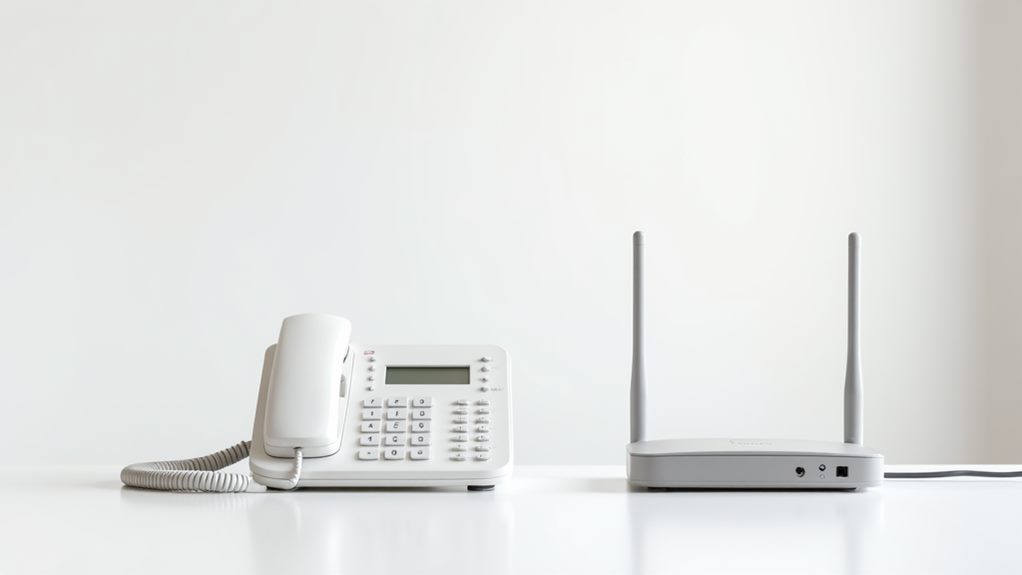bOnline offers the lowest-priced VoIP service at £7 per user monthly, followed by Google Voice for home use and Vonage Select at £9 monthly. You'll find better value with annual plans, saving up to 16.7% compared to monthly billing. While these providers offer budget-friendly options, you'll need to factor in potential setup fees (£50-£200), equipment costs (£30-£200 per unit), and monthly surcharges that can add 10-20% to base rates. The cheapest option isn't always the most cost-effective – understanding hidden fees and feature requirements will help you make a smarter investment decision.
Understanding VoIP Service Basics

VoIP technology transforms traditional phone systems by routing voice calls through internet connections instead of copper telephone lines. When you're considering a cheap VoIP service, you'll need to understand that these systems operate differently from conventional landlines while offering enhanced functionality at lower costs.
Remarkably, VoIP services can greatly reduce international calling costs for users, making them an appealing option for frequent callers.
As you explore various providers, you'll discover that VoIP services are typically more affordable than traditional phone systems, with plans starting from as low as £9 per month. You'll maintain control over your communication needs by selecting the features you need, such as video conferencing, call recording, and mobile integration.
The flexibility extends to keeping your existing phone number through number porting, ensuring a seamless changeover for your contacts.
One considerable advantage is that you're not tied to your Internet Service Provider for VoIP services. This independence allows you to shop around for the best combination of broadband and phone services that suit your requirements.
Whether you're making local or international calls, VoIP technology provides a cost-effective solution while delivering professional-grade communication features that traditional phone systems often charge premium rates to access.
Top Budget VoIP Providers
Among the most competitive VoIP providers, several companies stand out for their budget-friendly offerings in 2024. When you're searching for cheap VoIP providers, bOnline leads the pack with plans starting at just £7 per user per month, making it an attractive option for small businesses watching their budget.
Many of these providers, like Google Voice offer cost-effective solutions with features tailored for home use, ensuring unmissable communication.
Vonage Select and Gamma Standard compete closely in the entry-level segment, both starting around £9 per month. While Vonage Select focuses on basic telephony features, Gamma Standard distinguishes itself by including 2000 free landline and mobile minutes in its package, with scalable options up to £22.95 per user.
88 Express positions itself competitively at £10 monthly, offering unlimited calls within the UK plus video and audio capabilities that you'll find valuable for remote communication.
For teams seeking flat-rate monthly fees, Grasshopper's range of £14 to £55 provides affordable scalability as your business grows.
When comparing these VoIP providers, you'll notice they've structured their pricing to accommodate different business needs. Each provider offers distinct features within their price points, allowing you to select the most cost-effective solution that aligns with your communication requirements.
Monthly Vs Annual Pricing

When you're comparing VoIP pricing structures, monthly plans offer flexibility for cancellation but typically cost more over time than annual commitments.
For startups, cost savings with VoIP can be significant, allowing for better budgeting and resource allocation.
You'll find that annual billing can save up to 16.7% on your total costs, as demonstrated by providers offering £90 yearly plans versus £9 monthly plans, effectively giving you two months free.
Your decision should factor in both the immediate budget impact and long-term value, considering that promotional rates often increase after initial terms and annual plans generally lock in your rate for the full year.
Compare Monthly Payment Plans
Most VoIP providers offer two distinct payment structures: monthly and annual plans, with each option presenting unique financial implications for businesses.
When you're comparing monthly payment plans, you'll find providers like Vonage and bOnline offering competitive rates starting from £9 to £10 per user. While this isn't always the cheapest option compared to annual subscriptions, it provides essential flexibility for your business operations.
Before committing to any plan, you'll want to take advantage of free trial periods that many VoIP providers offer. These trials let you test the service's features and reliability without financial risk.
Remember that while monthly plans don't require long-term commitments, you won't benefit from the 10-20% savings typically available with annual subscriptions.
Consider your business's growth trajectory and scalability needs when evaluating monthly plans. You can easily adjust your service level or number of users month-to-month, but be aware that if you later decide to switch to an annual plan, you typically won't receive refunds for previous monthly payments.
This flexibility comes at a premium, so weigh your options carefully against your long-term communication requirements.
Annual Cost Saving Benefits
Businesses that commit to annual VoIP subscriptions can secure substantial cost savings compared to monthly payment options. For example, bOnline's annual billing structure offers £70 per user yearly instead of £7 monthly, resulting in £14 savings per user annually.
You'll find similar price differences across providers like NBC Cloud Voice, where monthly rates range from £9.99 to £24.99, but annual commitments provide lower rates and unlimited calling features.
When you opt for annual billing, you'll benefit from enhanced budgeting predictability and protection against potential price increases that often affect monthly subscribers. RingCentral's base rate of £9.99 per user monthly could fluctuate, while annual plans maintain stable pricing throughout your commitment period.
You'll also want to take into account the total cost of ownership, as annual plans typically shield you from hidden fees and unexpected charges that can accumulate with monthly billing.
Many providers sweeten annual commitments with additional incentives, including free trials and premium features at no extra cost. By analyzing these factors alongside your business needs, you'll determine whether the upfront investment in annual billing aligns with your long-term communication strategy and budget requirements.
Long-Term Contract Considerations
Several key factors influence the choice between monthly and annual VoIP contracts, each carrying distinct financial implications. When you're evaluating long-term contract options, you'll find that annual contracts typically offer considerable cost advantages through bulk pricing strategies, helping you maximize your communication budget.
You'll want to weigh the upfront investment of annual contracts against the flexibility of monthly subscriptions. While monthly plans let you adjust your service level or switch providers more easily, you'll often pay a premium for this freedom.
Annual contracts, though requiring more substantial initial outlays, can markedly reduce your total costs over time through providers like bOnline and NBC Cloud Voice.
Before committing to either option, you'll need to analyze the complete package of benefits. Annual contracts frequently come with enhanced features and premium services that aren't available with monthly plans.
However, you should carefully review termination clauses and potential penalties. Consider your business's cash flow situation, growth projections, and long-term communication needs when deciding between these options.
Remember that the lowest monthly rate doesn't always translate to the best value when considering the thorough benefits of annual commitments.
Essential Features Worth Paying For
Three core VoIP features consistently deliver measurable value for organizations: call forwarding, voicemail transcription, and call recording. When you're evaluating VoIP services, these capabilities form the foundation of an efficient communication system that adapts to your team's needs and enhances productivity.
While unlimited calls packages from providers like Vonage and RingCentral offer cost-effective solutions for high-volume calling, you'll want to reflect on advanced features that truly transform your operations. HD video conferencing capabilities and mobile app access prove essential for remote teams, enabling seamless collaboration regardless of location. Your investment in these tools directly impacts team connectivity and operational flexibility.
CRM integration represents another crucial feature worth the additional cost. Providers like NFON and Vonage offer robust customer service enhancement through seamless database connectivity, allowing your team to access significant customer information during calls.
Additionally, call analytics tools provide measurable insights into your communication patterns, helping you optimize performance and resource allocation. When you're choosing a VoIP provider, prioritize these features based on your specific needs rather than focusing solely on finding the lowest price point.
Hidden Costs to Watch Out

When evaluating VoIP providers' advertised low rates, you'll need to factor in setup fees ranging from $50-200 and monthly service surcharges that can add 10-20% to your base rate.
You're likely to encounter equipment costs not only during initial installation but also for replacement of phones, headsets, and routers over time, which typically aren't covered under basic service plans.
You must also scrutinize the fine print for hidden charges such as activation fees, number porting costs, and emergency service fees that can greatly impact your total expenditure.
Setup and Installation Fees
Looking beyond advertised monthly rates is essential when reviewing VoIP providers, as setup and installation fees can greatly impact your initial investment.
You'll find that while providers may promote competitive monthly rates, setup fees can range from £50 to £100, noticeably affecting your overall cost structure.
When evaluating providers, you'll need to factor in several upfront charges. Many services require a one-time activation fee between £10 and £50, and you'll likely encounter equipment costs that aren't immediately apparent.
VoIP phones can cost anywhere from £30 to £200 per unit if they're not included in your service package. Additionally, you'll want to carefully review service agreements for any recurring maintenance fees, which typically add £5 to £15 to your monthly expenses.
Before committing to any provider, you'll benefit from thoroughly examining their fee structure. Pay particular attention to equipment rental options, additional user license fees, and potential charges for specific calling features.
These hidden costs can transform what appears to be an economical choice into a more substantial financial commitment than initially anticipated.
Monthly Service Surcharges
Beyond initial setup costs, monthly service surcharges can greatly impact your VoIP expenses. While VoIP providers often advertise competitive monthly rates, you'll need to carefully examine the fine print to understand your true overall cost. Many providers add additional fees for essential features like call recording and international calling that aren't included in the base package.
You'll want to pay close attention to regulatory fees and taxes that providers typically exclude from their advertised pricing. These hidden costs can accumulate quickly, especially when you exceed your bundled minutes allocation. For instance, providers like Vonage and bOnline implement surcharges for extra usage that can greatly increase your monthly bill.
To avoid unexpected charges, you should thoroughly review the terms of service before committing to any VoIP provider. Look specifically for details about maintenance fees, support costs, and upgrade charges that may not be immediately apparent.
Consider your actual usage patterns and required features when calculating potential expenses. Remember that the lowest advertised monthly service rate isn't always the most economical choice when you factor in all supplementary charges and service surcharges.
Equipment Replacement Costs
According to market research, equipment replacement costs stand out as one of the most notable hidden expenses in VoIP adoption. When you're shifting to a VoIP system, you'll need to guarantee your hardware meets compatibility requirements, which often leads to additional expenses ranging from £30 to £200 per device.
Key equipment-related costs you'll encounter include:
- VoIP-compatible phones or adapters, which you'll need to purchase if your existing devices aren't supported
- Setup fees ranging from £50 to £150, depending on your system's complexity
- Maintenance and support costs, particularly for out-of-warranty equipment
While some providers offer equipment rental options, you'll find these monthly fees typically exceed the cost of purchasing devices outright over time.
You'll need to carefully evaluate whether to buy or lease your equipment, considering both immediate and long-term financial implications. When calculating your total VoIP investment, factor in potential hardware upgrades, including specialized routers and SIP phones.
These hidden costs can greatly impact your bottom line, making it vital to perform a thorough assessment of equipment replacement costs before selecting a provider.
Business Vs Personal Voip Plans
When choosing between business and personal VoIP plans, you'll find significant differences in both pricing and functionality. Business VoIP plans typically start at £7 per user monthly, while personal VoIP plans can be found for as low as £3 to £9 monthly through providers like Vonage and 88 Express.
Your business needs will likely require more sophisticated features than personal plans offer. Providers like RingCentral and NBC Cloud Voice include HD video conferencing and call analytics in their business packages, while personal VoIP plans focus on basic calling capabilities.
For unlimited calling plans, you're looking at around £10 per user for business solutions, though costs vary based on included features.
If you're running a small business, providers like Grasshopper and Dialpad offer specialized solutions with team collaboration tools and client management features. These aren't typically available in personal plans, which mainly provide essential communication functions.
While personal VoIP might be the cheapest VoIP option initially, you'll need to reflect on whether the limited support and integration options can sustain your professional requirements. Business plans, despite higher costs, deliver the thorough communication ecosystem most companies need.
Setup and Equipment Requirements

Setting up a VoIP system requires specific technical components to function properly. You'll need a reliable broadband internet connection with minimum speeds of 1 Mbps, though higher speeds directly correlate to better call quality.
Most VoIP providers emphasize proper network configuration, including QoS settings, to guarantee your voice traffic receives priority on your network.
Essential components for your VoIP setup include:
- A VoIP-compatible device (IP phone or softphone application)
- Stable power source or backup power system
- Broadband internet connection with recommended speeds
When choosing between VoIP providers, you'll find that many offer hardware packages tailored to your needs. Companies like 88 Express and Vonage provide equipment options through rental or purchase programs.
Your network configuration plays a vital role in the system's performance, so you'll want to confirm your router and related equipment support VoIP protocols effectively.
Remember that power dependency is a key consideration in your setup planning. Without battery backup or alternative power solutions, your VoIP service won't function during outages.
Consider investing in uninterruptible power supplies if continuous availability is essential for your communications needs.
Quality Considerations for Cheap VoIP
Choosing the cheapest VoIP provider requires careful examination of service quality metrics against cost savings. You'll need to analyze how budget-friendly options like Vonage Select at £9 and 88 Express at £10 monthly balance vital features with service reliability.
When evaluating quality considerations, you'll want to examine customer support accessibility and response times, as lower-priced VoIP providers may offer limited support channels. Your provider's service reliability directly impacts your business communications, so it's essential to verify uptime guarantees and network stability.
While basic plans include fundamental features like UK calling, you should scrutinize whether the absence of advanced functionalities might hinder your operations.
Watch for hidden fees that could offset initial savings. Many budget VoIP providers charge additional costs for setup, equipment, or premium features that might be standard with higher-priced alternatives.
International calling capabilities often separate basic from premium services, so if you're conducting global business, factor in these potential limitations.
Remember that your fellow business owners in the VoIP community often report that the cheapest option isn't always the most cost-effective when considering long-term quality and reliability needs.
Comparing International Calling Rates

The international calling rates among VoIP providers reveal significant variations that directly impact your operational costs. When evaluating mobile and landline VoIP plans, you'll find providers like Vonage offering competitive rates starting at 10p per minute for UK calls, while others like NBC Cloud Voice provide unlimited calls packages tailored for high-volume users.
Key differentiators in international calling offerings include:
- 88 Express's combination of unlimited UK calls with budget-friendly options for global destinations
- Grasshopper's flat monthly fees that include conference calling capabilities
- Vonage's flexible per-minute rates starting at just 10p for international connectivity
Your choice should align with your calling patterns and destination requirements. While some providers offer free calls to specific countries like Australia within their bundled minutes, others focus on providing competitive rates across a broader range of destinations.
For businesses engaged in frequent international communication, providers like NBC Cloud Voice's Enterprise plan deliver unlimited calling options that can substantially reduce your overall expenses. When selecting a VoIP plan, you'll want to analyze your most frequent calling destinations and match them with providers offering the most cost-effective rates for those specific locations.
Final Thoughts
By selecting a cost-effective VoIP provider, you'll reduce your communication expenses by 50-75% compared to traditional phone services. Your choice should balance features, call quality, and pricing structure while considering your specific usage patterns. Research indicates that 61% of businesses switching to VoIP achieve measurable cost savings within the first month. Evaluate international rates, hidden fees, and equipment requirements before making your final decision.

